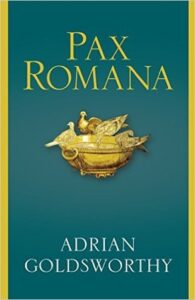 Pax Romana, Adrian Goldsworthy
Pax Romana, Adrian Goldsworthy
Pax Romana is a popular history style examination of the peace imposed by the Roman Empire, and how peaceful it actually was, as well as how it benefitted or oppressed the lands and peoples that fell under Roman sway. Although I called it popular history, it’s not super popularised: the evidence is meticulous, and the pace slow. It’s popular history in the sense of being perfectly comprehensible to the interested outsider to the field, rather than being simplistic.
The overall theory of the book is that the Pax Romana really was, in general, beneficial — and that Rome’s rule really was relatively peaceful and benign, with exceptions being just that rather than the overall rule. A lot of the time the evidence suggests that benignity was due to basically ignoring local squabbles and leaving places to govern themselves with minimal interference, while the legions only marched in for serious matters.
How far do I agree with Goldsworthy’s views, based on the evidence presented? Well, he definitely makes a good case for it, though I think he takes the long view to a great degree and I think there were likely people within the Roman Empire who felt oppressed by it, as well as people who were relatively unaffected by it. I do agree with his view that the Roman Empire wasn’t ruled simply through brutality: it certainly wouldn’t have had the longevity it did, if that were the sole basis, and it wouldn’t have been something people actively wanted to be part of — and it was something people wanted to be part of, more often than not.
It’s definitely a worthwhile look at whether the Roman Empire is really so degenerate as its painted.

Leave a Reply